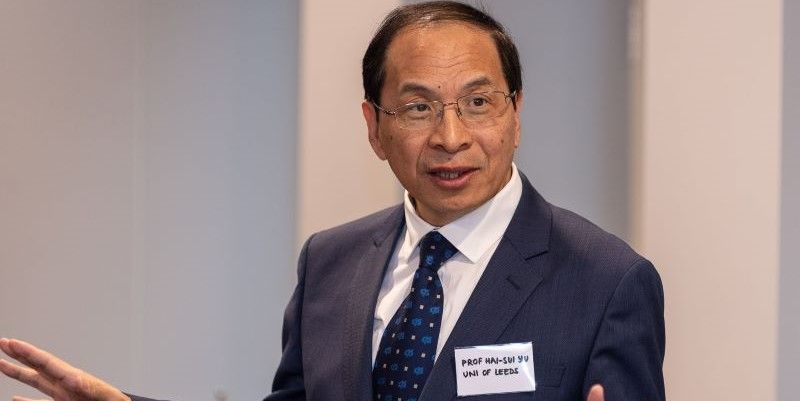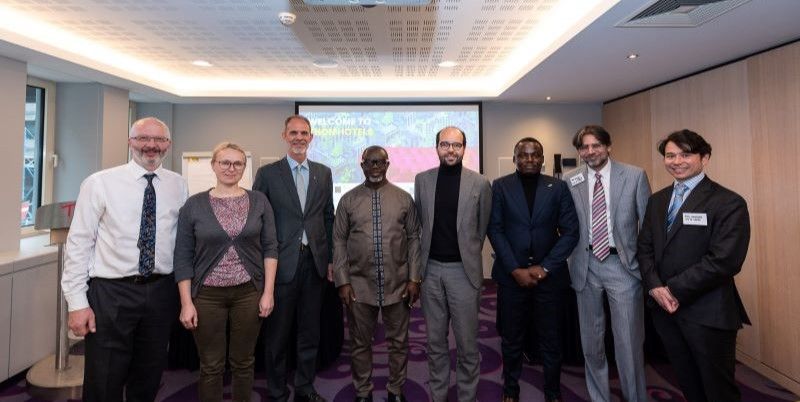European partnerships tackle global challenges

Higher education providers across Europe are joining forces to tackle global challenges.
Professor Hai-Sui Yu, Interim Vice-Chancellor and President of the University of Leeds, headed a delegation visiting institutions in Germany to further collaboration opportunities and enhance research, teaching and innovation partnerships with two strategic partners, Karlsruhe Institute of Technology (KIT) and the University of Hamburg.
Our strategic partnership agreement with KIT will allow us to continue our extensive joint activities and foster new partnerships that will help with some of the world’s most pressing challenges.”
The University signed a strategic partnership agreement with KIT which commits to extending collaboration in several areas including transport studies, polymer chemistry, robotics, advanced materials, weather, climate and data analytics.
Professor Yu said: “Our strategic partnership agreement with KIT will allow us to continue our extensive joint activities and foster new partnerships that will help with some of the world’s most pressing challenges.
“As a global University, we are committed to making a positive difference – by carrying out world-changing research and innovation, and amplifying this through international collaboration, we can maximise global impact.”
Professor Dr Oliver Kraft, Acting President of KIT, said: “Today, excellent science is no longer conceivable without transnational cooperation. International commitment is therefore an integral part of KIT’s self-image and characterises its strategic orientation. The strategic partnership agreement with the University of Leeds is an important part of the internationalisation strategy of KIT.”
One long-standing collaboration between Leeds and KIT features a cloud simulation chamber used in climate change research.
Professor Benjamin Murray, in the School of Earth and Environment, has a project with KIT to develop and commercialise the Portable Ice Nucleation Experiment Instrument (PINE) chamber for quantifying the concentration of atmospheric ice-nucleating particles.
The partnership has led to the commercialisation of the PINE chamber, with ten instruments sold to organisations around the world. This has allowed international data to be collected which will help to test global models to monitor climate change.
An academic workshop relating to this work was held as part of the visit, which took place between 15-19 April.
Professor Douglas Parker, also in the School of Earth and Environment, has worked with Professor Dr Peter Knippertz at KIT on a series of weather forecasting projects which have supported PhD students and post-doctoral researchers to spend two to three months with their respective partner institution to enhance their educational experience.
The work of Professor Parker and his colleagues in this area was key to the University of Leeds being awarded a prestigious Queen’s Anniversary Prize in 2021 for research into climate and extreme weather, aiding vulnerable communities in the Global South with new forecasting and warning systems.
Continuing strategic partnership work
The delegation also visited the University of Hamburg, with which Leeds signed a strategic partnership agreement last year, for a variety of workshops and to meet principal investigators leading seven joint projects. One of these, led by Dr Karen Forbes in the School of Medicine at Leeds who received internal seed funding and developed the project to receive joint funding with Professor Dr Sandra Blois at Hamburg, is now backed by a significant Medical Research Council award.
The project, which looks at gestational diabetes during pregnancy, will develop new approaches to enable successful pregnancy and the potential to prevent the risk to future generations of obesity and Type 2 Diabetes.
Professor Hai-Sui Yu, Interim Vice-Chancellor and President of the University of Leeds alongside Professor Dr Hauke Heekeren, President of the University of Hamburg and delegates from both institutions.
A constructive discussion explored opportunities for Leeds to work with the European University Alliance for Global Health (EUGLOH), a grouping of nine universities from across the continent.
Discussions were also held around strengthening the Knowledge Equity Network, of which the University of Hamburg has been a signatory since 2023. The network is a collaborative community of engaged institutions, organisations and individuals across the world that have signed up to tackle global challenges.
On the final leg of the trip, Professor Yu hosted a successful panel discussion event in Brussels with Professor Parker, a leading authority on the prediction of high-impact weather in our changing climate.

Professor Hai-Sui Yu hosted a panel discussion event in Brussels.
The panel included collaborators from the Kwame Nkrumah University of Science and Technology (KNUST) in Ghana, the Ghana Meteorological Agency, the European Commission, UN Environment programme and the Head of Climate and Environment at the UK Mission to the EU. In the audience were European Commission officials, University of Leeds alumni and representatives of European universities and European think tanks, and climate stakeholders.

Delegates from the University of Leeds speaking at a panel discussion event in Brussels.
Further information
For more information, please contact Corporate Communications Officer, Rebecca Hurrey at r.hurrey@leeds.ac.uk in the University of Leeds Press Office.
For more information on the Knowledge Equity Network, please visit the website.
Related
A New Book Argues That What Happens in Europe Doesn’t…
Remaking the World: European Distinctiveness and the Transformation of Politics, Culture, and the Economy by Jerrold Seigel “No issue in world
Poland plans military training for every adult male amid growing…
Poland’s prime minister, Donald Tusk, has said his government is working on a plan to prepare large-scale military training for every adult male in response t
2025 European Athletics Indoor Championships: Ditaji Kambundji secures women’s 60m…
Switzerland’s Ditaji Kambundji walked away from the 2025 European Athletics Indoor Championships in Apeldoorn on 7 March with much more than her first Europea
Takeaways from the EU’s landmark security summit after Trump said…
BRUSSELS (AP) — European Union leaders are trumpeting their endorsement of a plan to free up hundreds of billions of








